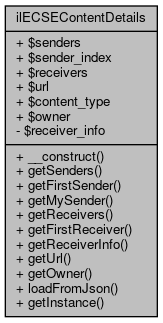Presentation of ecs content details (http://...campusconnect/courselinks/id/details) More...
 Collaboration diagram for ilECSEContentDetails:
Collaboration diagram for ilECSEContentDetails:Public Member Functions | |
| __construct () | |
| getSenders () | |
| Get senders. More... | |
| getFirstSender () | |
| get first sender More... | |
| getMySender () | |
| Get sender from whom we received the ressource According to the documentation the sender and receiver arrays have corresponding indexes. More... | |
| getReceivers () | |
| Get recievers. More... | |
| getFirstReceiver () | |
| Get first receiver. More... | |
| getReceiverInfo () | |
| Get receiver info. More... | |
| getUrl () | |
| Get url. More... | |
| getOwner () | |
| loadFromJson ($json) | |
| Load from JSON object. More... | |
Static Public Member Functions | |
| static | getInstance ($a_server_id, $a_econtent_id, $a_resource_type) |
| Get data from server. More... | |
Data Fields | |
| $senders = array() | |
| $sender_index = null | |
| $receivers = array() | |
| $url = array() | |
| $content_type = array() | |
| $owner = 0 | |
Private Attributes | |
| $receiver_info = array() | |
Detailed Description
Presentation of ecs content details (http://...campusconnect/courselinks/id/details)
- Version
- $Id$
Definition at line 32 of file class.ilECSEContentDetails.php.
Constructor & Destructor Documentation
◆ __construct()
| ilECSEContentDetails::__construct | ( | ) |
Definition at line 43 of file class.ilECSEContentDetails.php.
Member Function Documentation
◆ getFirstReceiver()
| ilECSEContentDetails::getFirstReceiver | ( | ) |
Get first receiver.
- Returns
- int
Definition at line 121 of file class.ilECSEContentDetails.php.
References getReceivers().
 Here is the call graph for this function:
Here is the call graph for this function:◆ getFirstSender()
| ilECSEContentDetails::getFirstSender | ( | ) |
get first sender
Definition at line 94 of file class.ilECSEContentDetails.php.
◆ getInstance()
|
static |
Get data from server.
- Parameters
-
int $a_server_id int $a_econtent_id string $a_resource_type
- Returns
- ilECSEContentDetails
Definition at line 55 of file class.ilECSEContentDetails.php.
References $ilLog, $res, ilECSSetting\getInstanceByServerId(), and ilECSConnector\HTTP_CODE_NOT_FOUND.
Referenced by ilECSObjectSettings\addSettingsToForm(), ilECSObjectSettings\getParticipants(), ilRemoteObjectBase\handleUpdate(), and ilECSObjectSettings\sendNewContentNotification().
 Here is the call graph for this function:
Here is the call graph for this function: Here is the caller graph for this function:
Here is the caller graph for this function:◆ getMySender()
| ilECSEContentDetails::getMySender | ( | ) |
Get sender from whom we received the ressource According to the documentation the sender and receiver arrays have corresponding indexes.
Definition at line 103 of file class.ilECSEContentDetails.php.
References $sender_index.
◆ getOwner()
| ilECSEContentDetails::getOwner | ( | ) |
◆ getReceiverInfo()
| ilECSEContentDetails::getReceiverInfo | ( | ) |
Get receiver info.
- Returns
- array
Definition at line 133 of file class.ilECSEContentDetails.php.
References $receiver_info.
◆ getReceivers()
| ilECSEContentDetails::getReceivers | ( | ) |
Get recievers.
- Returns
- <type>
Definition at line 112 of file class.ilECSEContentDetails.php.
References $receivers.
Referenced by getFirstReceiver(), and loadFromJson().
 Here is the caller graph for this function:
Here is the caller graph for this function:◆ getSenders()
| ilECSEContentDetails::getSenders | ( | ) |
Get senders.
- Returns
- array
Definition at line 86 of file class.ilECSEContentDetails.php.
References $senders.
◆ getUrl()
| ilECSEContentDetails::getUrl | ( | ) |
Get url.
- Returns
- string
Definition at line 142 of file class.ilECSEContentDetails.php.
References $url.
◆ loadFromJson()
| ilECSEContentDetails::loadFromJson | ( | $json | ) |
Load from JSON object.
@access public
- Parameters
-
object JSON object
- Exceptions
-
ilException
Definition at line 159 of file class.ilECSEContentDetails.php.
References $i, $ilLog, $index, and getReceivers().
 Here is the call graph for this function:
Here is the call graph for this function:Field Documentation
◆ $content_type
| ilECSEContentDetails::$content_type = array() |
Definition at line 38 of file class.ilECSEContentDetails.php.
◆ $owner
| ilECSEContentDetails::$owner = 0 |
Definition at line 39 of file class.ilECSEContentDetails.php.
Referenced by getOwner().
◆ $receiver_info
|
private |
Definition at line 41 of file class.ilECSEContentDetails.php.
Referenced by getReceiverInfo().
◆ $receivers
| ilECSEContentDetails::$receivers = array() |
Definition at line 36 of file class.ilECSEContentDetails.php.
Referenced by getReceivers().
◆ $sender_index
| ilECSEContentDetails::$sender_index = null |
Definition at line 35 of file class.ilECSEContentDetails.php.
Referenced by getMySender().
◆ $senders
| ilECSEContentDetails::$senders = array() |
Definition at line 34 of file class.ilECSEContentDetails.php.
Referenced by getSenders().
◆ $url
| ilECSEContentDetails::$url = array() |
Definition at line 37 of file class.ilECSEContentDetails.php.
Referenced by getUrl().
The documentation for this class was generated from the following file:
- Services/WebServices/ECS/classes/class.ilECSEContentDetails.php






